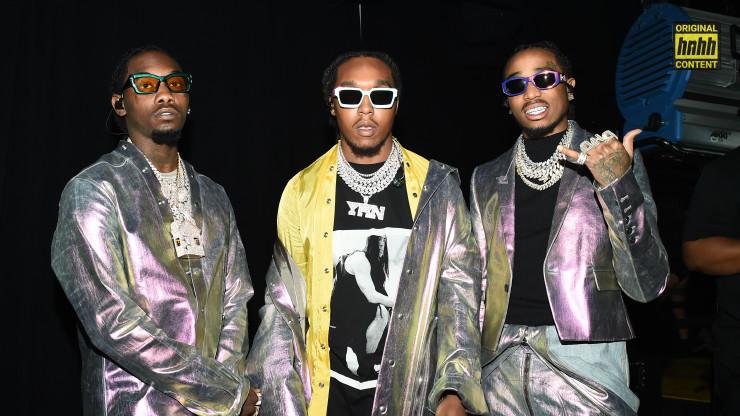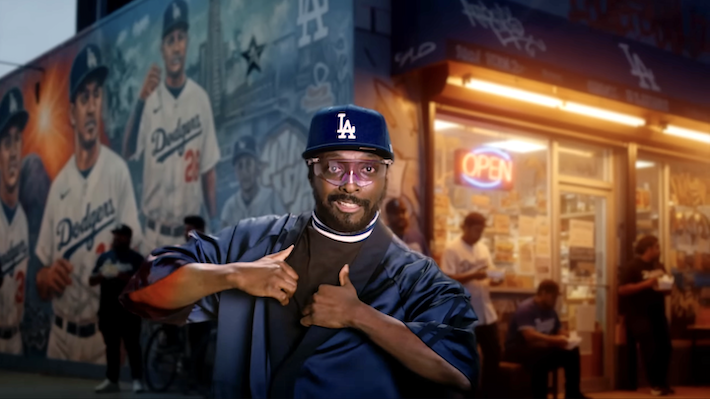The Migos ad-libs have become some of the most iconic, and possibly even best, in hip-hop history.
With eyes pinned shut and an imaginary sub-woofer in each ear, think about your favorite rap song. Now summon the words. Chances are if it’s REALLY your jam, you didn’t stop at the lyrics. I would guess that ad-libs were a big part of the impromptu recital as well. This unique second layer of sound serves as part sonic measure of emphasis, part medallion of stylistic independence. It’s often the most enjoyable part of our beloved tracks to emulate. Using their voices as an additional instrument to the production, rappers have found a host of ways to put a stamp on their definitive tunes. The long-running catchphrases can even take on a body of their own, penetrating the pop culture lexicon. It’s honestly crazy how the simplest of words or phrases can become so synonymous with an artist.
Let’s play a game. I’ll say an ad-lib, you name the artist:
“Okayyy!”
“Cheeeaaa!”
“Bow!”
“Ugh!”
“Skrt, Skrt!”
Even if you aren’t the biggest hip-hop fan, those sounds likely registered and the artist responsible immediately popped into your head. I personally have a habit of sitting by myself and randomly yelling “Offset,” “Mama,” or Ice!” These are some of the ad-libs we couple with the Atlanta rap group . A trio who, in my opinion, took the craft to a new level of beautiful obnoxiousness. Even though they’re sometimes weird and make absolutely no sense, the swagger of these short outbursts is infectious. Dare I say brilliant. As a matter of fact, when I’m struggling to get my point across at work, I sometimes wish the Migos ad-libs were their own dialect. I’d opt to communicate exclusively in that fashion. In modern rap, ad-libbing has become its own art form – and if you believe that to be true, Migos are the Bach, Chopin, and Beethoven of the game.

Dia Dipasupil/Getty Images
Few groups in the last decade have influenced the rap game like Migos. From the way they dress, their over-the-top jewelry to the aforementioned ad-libs. Breaking out in 2013, the cast partially changed the style of rap. Their signature flow has even been mimicked by the likes of J Cole, , and Kendrick Lamar. Before the meteoric rise, the three Atliens connected in 2009. All family members, they first went by the moniker Polo Club. From 2009-2012 they had several small releases but nothing that captured a national audience. It wasn’t until 2013 when they released “Versace” that the three would skyrocket up the charts and capture the hearts of hip-hop enthusiasts. Here is where the “triplet flow” got famous. For those unaware, a triplet happens when three notes occur over one beat. In the Migos case, instead of notes its three syllables in a given word or phrase. Baked into the triplet flow are the even more illustrious ad-libs.
After the release of Culture II, someone launched an entire interactive site dedicated to their ad-libs. On the same album, Migos managed to stuff 1,967 total ad-libs into one hour and 45 minutes. It’s an enormous part of what makes them who they are. And it’s fair to say that few have perfected ad-libbing like Offset, Takeoff, and Quavo, who already declare their influence in rap and fashion to be legendary.

Shareif Ziyadat/Getty Images
Rappers are always looking for a way to distinguish themselves. Emcees have long sought to do this in a number of different but equally effective ways – both on and off the microphone. Where some place their focus on lyrical content others put a premium on style, delivery, and cadence. Ad-libs have become a measured way of branding and marketing the overall persona of an artist. Over the past decade, there seems to have been a shift in hip-hop where artists are focusing more on style than substance. How you’re saying it is as important as what you’re saying nowadays. Ad-libbing is essentially extemporaneous improvisation. Rappers from the northeast like may have pioneered modern ad-libbing but the south perfected it. Just reference artists like Baby, , , and of course Young Jeezy.
It is important to note that rap’s infancy is littered with artists that utilized ad-libbing. The Zulu Nation and Kurtis Blow were a few trailblazers worth mentioning. But digging even deeper than that, James Brown incorporated ad-libbing into his music way back in the 1970s. It could even be argued that the practice birthed from jazz, blues, and funk, genres that heavily featured elements of improvisation. The early 2000s, however, saw a new era of ad-libbing emerge with artists like at the forefront. This is the foundation Migos used to build on, carving out their own place in hip-hop history. Together, these three Atlanta rappers built on the legacy of an obscure art form as no one has — or maybe ever will.




